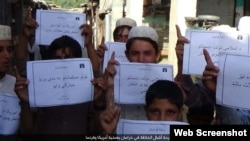The U.S. is being urged to take a more sensitive and personalized approach to fighting the Islamic State terror group if it wants to replicate some of the success it has had on the physical battlefield in cyberspace.
Former counterterrorism officials caution this would be a time-consuming approach, unlikely to result in immediate gains, but one that ultimately could stave off attacks like the shooting earlier this month at a gay night club in Orlando, Florida, that left 49 people dead.
"What you're essentially looking for is a non-law enforcement approach," said Seamus Hughes, deputy director of George Washington University's Program on Extremism.
Hughes, who specialized in community outreach while with the National Counterterrorism Center, made the pitch Thursday to members of the House Foreign Relations Committee, saying there are plenty of people within the Muslim community who are willing to help counter IS’s online presence and simply need the right support.
"You bring a social worker, a mental health professional, a religious leader," he said. "You bring them to the table and say this is a kid we're worried about."
The approach has been steadily gaining popularity in Europe and with the Obama administration, which has seen previous Washington-centered, law enforcement counterterror messaging efforts met with ridicule, both online and in Congress itself. One lawmaker labeled State Department efforts on Twitter as "laughable."
Countering IS fan club
Even as reports suggest continued gains by U.S. and coalition backed forces against IS fighters in Syria and Iraq, lawmakers have been concerned by the terror organization's continued ability to mobilize sympathizers using the internet and social media.
"The United States, which is the world's leader in technological innovation, is hardly in the game," House Foreign Affairs Committee Chairman Ed Royce said Thursday, calling the pace of U.S. cyber operations slow and inadequate.
And IS has proven to be a formidable online enemy.
"ISIL has been more successful and effective in exploiting the internet than any group I have seen in 17 years of researching terrorism," Peter Neumann, the director of the International Center for the Study of Radicalization (ICSR) at King's College in London, told lawmakers. ISIL is an acronym for Islamic State.
But he cautioned it is not the terror group's technological expertise that makes it so dangerous.
"What we call the cheerleaders and fanboys and wannabes — people who aren't actually members of ISIL, who aren't actually in Syria, but are, essentially, freelance supporters, often based in the West — they are the ones who are giving the group its online oomph," Neumann said.
Putting a stop to the IS online echo chambers, he said, can only be done with an equally personal approach that is safe both for the person in danger of being radicalized and for their friends and family.
"They will leave it until the very last minute when it's usually too late," Neumann said, "If you want them to call early, when something can still be done, you need to give them the confidence that the kid is not going to be immediately arrested."
Panelists also urged the U.S. government to give communities more legal guidance, saying many of those who are willing to speak out and counter IS messaging fear falling under the suspicion of law enforcement if they engage online with known or suspected terrorists.






